The development of healthcare apps is at the forefront of technological advancement, fueled by the desire for better accessibility, cost-effectiveness, and efficacy in patient healthcare. Mobile apps are leveraged to change how we use essential services such as remote patient monitoring, telehealth, and medical administration. With technology evolving rapidly, health organizations worldwide invest heavily in developing custom apps for healthcare. This presents a huge potential for Healthcare App Development Company to create unique solutions to meet the ever-growing needs of doctors and the industry in general.
This article explores the world of health app development. It provides a thorough overview of its many aspects, from the types of benefits to the critical steps to development and compliance issues.
There is much ground to cover, so let's get started!
What Are Healthcare Apps?
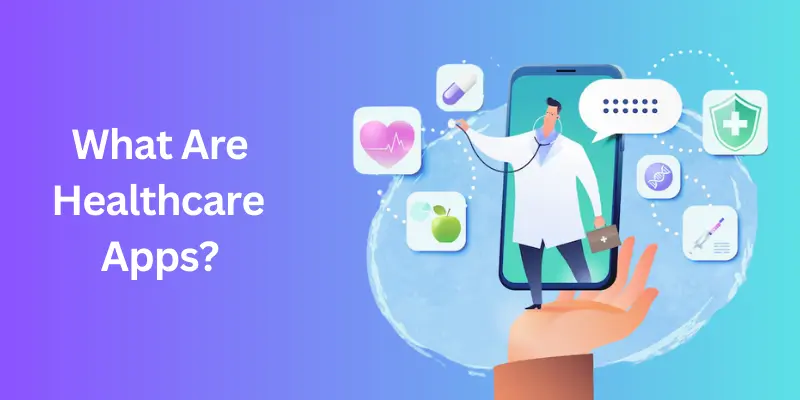
Healthcare apps are designed to provide healthcare and health solutions. They range from telemedicine applications, which allow medical professionals to have consultations remotely, to fitness and wellness monitoring devices that keep track of everyday health indicators. Healthcare apps are gaining popularity and becoming more significant, specifically because technology is integrating more deeply into the medical field. They help make healthcare more accessible, improve patient interaction, and speed up medical workflow.
The development of these apps requires understanding both patients' needs and technological capabilities. It is essential to ensure that the applications aren't just functional but also comply with healthcare rules. One example is a pill management app. This demonstrates how app development for healthcare integrates technological innovation and practical solutions, dramatically improving the quality of patient care.
Reasons To Invest In Healthcare Applications
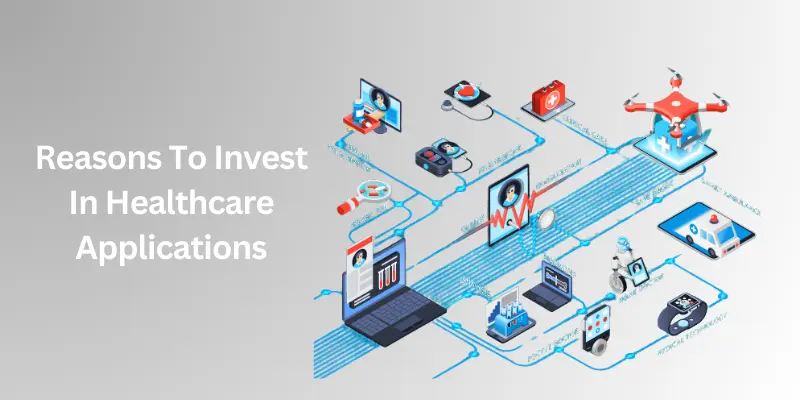
Investing in developing healthcare apps is crucial because they help improve patients' health and quality of life. Patients ' aid is within reach when a health app is at your fingertips.
Productivity Improvement
The database linked to medical apps allows physicians to access a patient's digital medical record, examine the outcomes, and quickly develop a different template. This information will enable physicians to treat several patients simultaneously, giving each patient more time and attention and improving administration quality.
Patients Are Responsible For Their Well-Being
It's about time that everyone began to be accountable for their health and place their health in the first place. It is now easier than ever to help people take charge of their health thanks to the development of medical applications for people with illnesses, such as wellness trackers, fitness trackers, and wearables for health. The ability to keep track of physical capabilities, such as beat rate and heartbeat, can be achieved. The wellness band will also guarantee that they exercise regularly, monitor their food habits, and make informed decisions.
Integrate Systems In The Hospital Or Clinic
A mobile healthcare application can facilitate the centralization of every operation. It integrates every process, including the encoding and retrieving patient data, medical claims/insurance information, and other documents. The functions allow you to connect every process into one platform, allowing smoother operations during crucial hours. Additionally, it facilitates health care access for the patient, who can access their medical documents, schedule a doctor's consultation, ask for lab tests, schedule an online consultation to consult their physician, and submit an insurance claim. The process is more straightforward when you use a multi-functional application. A custom-designed healthcare app for your clinic or hospital is the most beneficial decision to make.
Speed And Adaptability
Mobile apps make human service and App Forms for Development Companies easier and more flexible for patients. Patients are freed of the dread of standing in lines to make appointments, change or cancel them, or gather the necessary information. You can find a specialist's schedule, reserve an appointment, and pay for the expenses for the conference. They can also help increase speed and adaptability within the human service industry.
Healthcare Standards
Consider this before you begin your first application for social insurance. HIRA security and protection rules must be included to make your application secure for patients. Have you researched the prerequisites for the insurance you plan to include in your application? The plan of your flexible application must be brief and easy to understand. It is crucial to determine the group of interest before the turn of events begins.
Access Most Important Information Even When Offline
A mobile health app allows you, your hospital personnel, and your patients to view the stored data within your account, even when offline. You can retrieve crucial information, such as prescriptions you can present to your pharmacy or lab requests you give to a medical technologist. The application offers the benefit of storing your medical records anytime and anywhere. It also allows you to access your medical records without the internet or WiFi.
This app is ideal for frequent travelers with diabetes, hypertension, or other chronic illnesses who require regular health care and medication and want to safeguard the privacy of their medical information. Patients with chronic diseases require immediate access to health information during emergencies, and they may also benefit from having a health mobile application.
Healthcare Software Ecosystem: What To Expect?
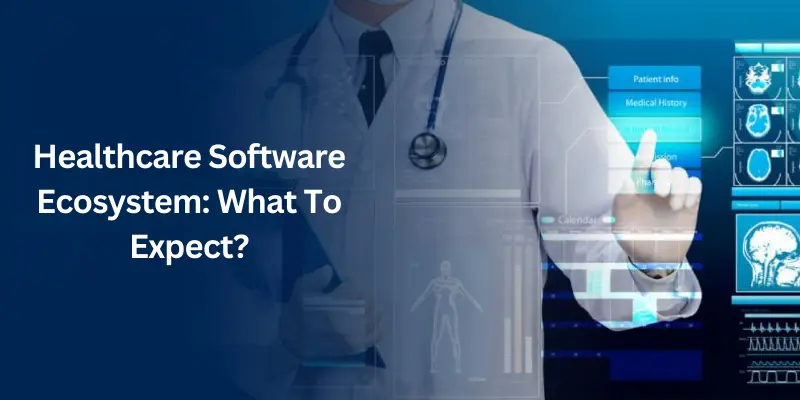
An ecosystem for healthcare is a collection of services and capabilities that include major participants (patients, hospitals, clinic providers, platforms, and service suppliers) using innovative software.
We will examine how integrating software modules into a Healthcare Mobile Application could accomplish specific commercial goals. These modules are connected to an EHR system to ensure the accuracy of patient information between software. The principal goal of creating an ecosystem for healthcare is to facilitate more seamless data sharing and to provide increased transparency and security for healthcare professionals and patients. Regardless of whether you're a healthcare institution or a vendor that offers healthcare-related services.
ERP And CRM software For Healthcare Organizations
Healthcare management is heavily dependent on cost reduction and efficiency. Positive improvements can be made through automation of the business process, using Enterprise Resource Planning (ERP), Hospital Management Software (HMS), and Customer Relationship Management (CRM) systems. This applies to all hospitals.
Solutions To Manage Medical Records
The traditional papers used in medical journals are less popular, but there's room for improvement in this field. Physicians need custom software developed specifically for healthcare to create user-friendly mobile and web-based applications that efficiently manage patients' medical records. They can help organize information, reducing the chances of errors made by humans because of data overload. Additionally, voice inputs could be used in place of manual notes, which allows doctors to input data about patients directly to the application during medical exams.
Medical Data Transfer Systems
The transmission of medical data, which includes monitoring fundamental indicators like body temperature or blood pressure, is essential in the diagnosis process and patient care. Most of the time, these functions are performed by doctors and manually transmitted to various electronic systems. We can anticipate an era when most patients can monitor their vital indicators using smartphones or other gadgets. This will dramatically improve the speed and ease of data transfers.
Applications For Effective Tracking And Plan
Apps for healthcare could improve timing management and treatment plans. Patients can use accessible calendar applications to help them be aware of doctor appointments, vaccination schedules, and medication reminders. They can also help collect vital information to manage chronic illness. Although health maintenance takes lots of work and can be time-consuming, an easy-to-use health mobile application can make this easier.
Referrals To Medical Professionals
At many doctors' clinics, the difficulty of navigating medical and drug reference guides has been an issue of the past. Mobile devices have emerged as the ideal method for accessing reference books for doctors who have to be on the move or work from remote areas.
AI-Based Systems To Automate Paperwork
Many hospitals still deal with paper documents every day. These could include patient prescriptions, surgery schedules, admission and registration forms for patients, and health insurance claims. Thanks to OCR technologies, handling documentation on paper is automated. Any document a hospital has to deal with on paper could be converted into digital format and even automated.
Diagnostic And Healing Systems Tracer Of Processes
Specific diagnostic procedures can be simple enough for sophisticated equipment. This makes phones and tablets better alternatives for doctors than conventional devices, diagrams, and instruments. The portability of tablets is particularly beneficial for physicians who have to perform their work moving around.
Our team developed an application to monitor patients' wound healing as part of a project for one of our clients. Patients were required to photograph certain areas. The specific algorithm calculated the extent of the injured zone to assist medical professionals in making the best treatment choices.
Telemedicine Apps
Patients can get quick online appointments by telemedicine using mobile or web-based healthcare applications if they can. Virtual appointments can be more efficient and convenient to schedule than travel to a distant hospital. Messenger systems are a great option to ensure smooth and quick communications when patients require immediate assistance from their doctor.
Apps For The education of Patients And Assistance
Health mobile apps emphasizing patient education allow doctors to relay vital information to patients quickly. Interactive applications help physicians explain the symptoms and medical conditions in depth to ensure patients gain more excellent health knowledge.
Well-Being And Fitness Apps
In the present, well-being and wellness are not just about preventing disease but also about efforts to maintain an ideal lifestyle of balance, which includes regular exercise and nutritious eating. Tracking eating habits and fitness applications have gained popularity as tools that help individuals achieve their fitness goals.
Must-Have Healthcare App Features
We will examine a few essential elements of your health app and discuss the benefits of each.
-
-
Features Of Patient App
-
Appointment
In a time when everything is just a click away, why not make an appointment with your physician? Online appointments are time-saving, reduce waiting times, and are more efficient for the doctor and patient. They are a fully integrated and solid feature of medical apps, allowing quick access to appointments anytime by connecting experienced doctors.
Telemedicine
Doctors have deemed telemedicine an effective method of monitoring and treating chronic illnesses more effectively in a shorter time than a traditional one-on-one chat. Custom Healthcare Software Development is dramatically changing how doctors and patients interact with one another despite the geographic distance.
You'll need the person examined for treatments requiring physical input. The alternative is photos-based consults. It is used for the treatment of injuries to the skin, bruises, or eye infections. This app permits patients to take photos for consultations based on photographs, which are then stored on a separate server accessible from the physician's application only.
Furthermore, the doctor can determine the cause of the problem and communicate relevant details to patients. The doctor could arrange a video conference and issue lab test prescriptions through the application if additional information is needed.
e-Prescription
Through the e-prescription function, doctors can create prescriptions without mistakes, improving communication and patient satisfaction. It also lets doctors view prescription insurance formulary information, which is comprised of information in electronically connected pharmacies. Once integrated into patients' electronic health records, electronic prescriptions allow you to record the details. This can help establish complete records of a patient's treatment throughout the treatment.
EHR
Electronic Healthcare Records are a service that is available to patients as well as physicians. It allows patients and doctors to view all their medical records from the same space. It is also possible to enhance the functionality of this feature by remote access to images from medical imaging. This is accomplished through uploading and sharing of the images via the use of a HIPAA-certified server. Sometimes, examining scans remotely through a medical device is the same as on an ordinary computer.
Pill Reminder
Patients' loyalty to medications is essential in treating chronic diseases. Due to the large number of patients relying on pharmacological treatment, the inability to take medication regularly and follow treatment protocols can negatively affect patients' results and healthcare expenses. The primary purpose of this system is to serve as reminders. It sends push notifications based on an electronic prescription. Additionally, you can create your calendar.
One-Click Ambulance
This is a must-have feature for helping with emergencies during unplanned situations. A one-click ambulance call could be beneficial in this situation. The feature lets you ask yourself, your friends, or your relatives for assistance in times of emergency. The feature informs trusted contacts and the hospital with its precise address. In addition, you can locate nearby pharmacies and laboratories for assistance in emergencies.
Hospital Wayfinding Map
Finding yourself lost in the hospital is typical, particularly among older people. In a hospital with multiple specialties, missing directions is normal. This great feature makes it easy for people to navigate from their doctor to their parking space.
-
-
Features Of Doctor App
-
Doctor's Profile
One crucial aspect of a patient's experience is finding a qualified doctor. Choosing from the available options isn't the best choice. The doctor's profile saves time for patients and doctors and enhances the efficiency of the doctor-patient matchmaking process.
Schedule Management
This function gives patients and doctors a fast and secure appointment booking experience. The feature is only available within the doctor's application for doctors.
-
-
Doctors can view appointment requests and type them, all from one location.
-
The appointment reminds doctors about their appointments coming up.
-
Additionally, it allows you to see the appointment's status. You can also create time slots to allow for instant scheduling of patients.
-
You can also change or cancel appointments if the person mentions why they're unavailable or if they have a situation requiring it.
-
Using ePrescription, doctors can directly transmit the reports and other information to their patients.
-
Patient's Dashboard
The patient's dashboard summarizes the person's medical and personal data. It functions as an adjustable display of vital details about the patient to provide quick and effective treatment plans. The dashboard could include information such as the history of diagnosis and lab results, nutritional value and vitals, treatment medical records, prescriptions, etc. Additionally, you can create dashboards to display graphically the latest trends regarding medical diagnosis or department-specific views of information on clinical conditions.
Electronic Prescription
If you're unfamiliar with it, the technology framework that lets doctors compose prescriptions and then send them to their patients and pharmacies. E-prescriptions are a decision assistance tool. They give healthcare providers an immediate overview of an individual's medical history and details about their prescription insurance so they can be better informed about their choices.
On a fundamental level, the e-prescription is an electronic handbook for reference. The more advanced versions can generate and refill prescriptions for patients and track medication and patient information. They can also connect to pharmacies or another site for dispensing drugs and integrate with electronic medical records systems. This is among the most popular because it minimizes the risk of prescription mistakes due to poor handwriting or inaccessibility from faxes.
Clinical Photo Capture
This function allows physicians to use high-quality, consistent images of patients in a reproducible procedure. In addition, it assists the doctor in using photographs before and after consultations to convert them into processes and cross-sell items and services. The Clinical Photo Capture feature can be created using multiple-level security protocols to keep photographs secure and monitor who's accessing them and what actions the image performs at any time. It's a HIPAA-approved service that takes on the lengthy task of managing your photos.
Healthcare App Compliance: Risks And Regulations To Consider
Before moving on to other aspects of the design process, let's overview the issues and guidelines for this field. Because healthcare apps collect and save individuals' health information, reducing the chance of data breaches is essential. Data breaches can have adverse consequences, including unauthorized access, hacking, information leaks, and malware software uploads.
In addition, healthcare applications have to undergo approval procedures through relevant organizations within the industry to ensure compliance with applicable rules. Managing the technical aspects of health apps to protect data contributes to this issue because developing a compliant app and securing the required approvals will require additional resources, such as time and cash.
The process of developing healthcare apps must comply with laws and regulations at the local and international levels. These laws and regulations are vital to ensuring app operations' security and data privacy. Different regions and countries have specific rules that apply to healthcare apps.
Steps To Build a Healthcare App
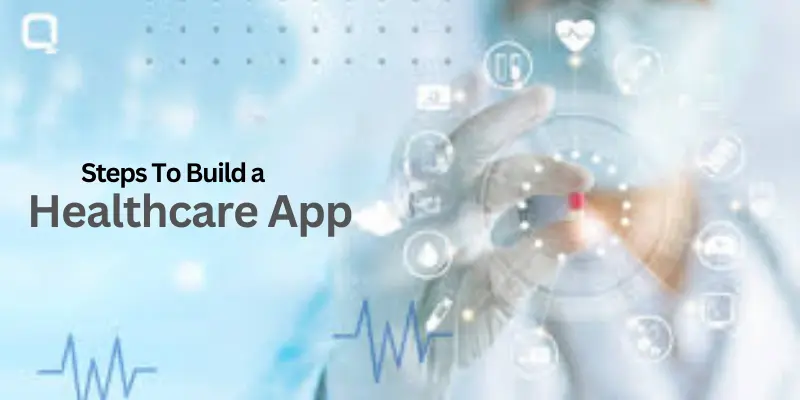
The development of mobile apps for healthcare is a challenging task. There are numerous distinctions and subtleties in other apps that you will need to take into consideration. This is the complete list of actions:
Do Market Analysis
It's as simple as that. Your healthcare mobile app will be time-consuming if it's ineffective. Healthcare mobile app development involves market analysis. It is essential to research your market, learn more about your competition, what value they provide, their strengths and weaknesses, and how to make yourself stand out.
Study Your Audience
The most crucial aspect here is the research phase for users. When developing healthcare applications is a must, it is essential to be ready for those issues that are sensitive to people. Interviews and focus groups or surveys are challenging because you must maintain the balance by getting to the source of the problem and balancing ethics and honesty.
Pick The App Type You'd Like To Build
Based on your assessment of your target audience, competitors, and the regulatory landscape, you are now more prepared to decide if your app can be tailored to the needs of medical specialists or patients. Whichever you choose to go with, it is essential to focus. We recommend that you focus only on a single group for help to start. This makes creation and development more accessible and reduces costs for the future. Additionally, during the process of deciding which of doctors and patients:
-
-
Get the highest return for your investment in the app you're using
-
Limit your legal risk to a manageable amount
-
Let you tackle health issues that you're passionate about.
-
Conform to the Regulatory Requirements
-
Conformity with regulations is essential when determining the process of developing a health application. The inability to comply with these requirements could lead to legal problems, data breaches, and the loss of trust among users. Ensuring you comply with regulatory requirements is the basis of an app that is successful in healthcare. When you understand how to create an app for healthcare by complying with applicable regulations, implementing adequate security measures, and documenting compliance, you can make a reliable and secure platform to store healthcare information. Without this, it could cause negative legal and reputational consequences.
Design User-Centric Interfaces
The designing stage of your app for healthcare is when user experience (UX) and user interface (UI) design enter the equation. In conjunction with UX and UI experts, design a visually pleasing interface that is intuitive and easy to use. Make sure to create processes and interfaces that are simple to comprehend, particularly for health professionals who might utilize the application in stressful circumstances.
Make use of features that simplify tasks, including effective information entry, appointment scheduling, and the management of prescriptions. Also, think about accessibility standards for your app to ensure it can be utilized by people who are disabled and adhere to the guidelines. When you design your app with a focus on the user, enhancing the user experience and increasing satisfaction, it makes your helpful app in the healthcare ecosystem.
Build a Secure And Scalable Infrastructure
An efficient and flexible infrastructure is vital to guarantee the security and efficiency of your health app. Think about the following aspects:
-
-
Choose a secure hosting system with backups and disaster recovery strategies, such as HIPAA-compliant cloud hosting services.
-
To safeguard data in transit and at rest, use secure encryption (SSL/TLS).
-
Create access control based on the role of restricting access to patient information and preventing unauthorized access.
-
Prepare for scalability in advance by using scalable databases, load balancing, and the ability to cache for future users and growing data.
-
Compliance and security are crucial to establishing a successful healthcare app. Perform regular security checks and assessments of vulnerability to ensure your system is up to date with the latest patches.
-
Perform periodic compliance audits to keep healthcare information legal standards.
-
The system you choose to use will be the basis of your app for healthcare. Selecting a secure host environment, implementing strong encryption, and planning for scaling are crucial. Regular security audits and compliance checks help maintain your server's security as time passes.
Develop And Test the App
The development and testing phases are the areas that bring your health app to existence. Using the most effective software development and quality assurance techniques in these phases is crucial. Your healthcare app develops in these phases. Utilizing a skilled development team using agile methods while conducting rigorous tests is essential. User training and thorough bug tracking are necessary to ensure the launch is successful without significant interruptions.
Launch And Market The App
Once the testing and development stages are completed, the next step is to launch your app for healthcare for public use. To ensure your launch is successful, have a thorough marketing strategy targeting your desired clients, who could be medical professionals, patients, or both.
Consider collaborating with medical organizations or other providers to help promote the app in their network. Create a constant dialogue with users to collect insights and feedback for continual enhancement. Every month, we release enhancements and updates to fix issues, add additional features, and remain at the forefront of the app for the healthcare marketplace. The marketing process and continuous improvement are vital to the app's sustainability and long-term viability.
Costs Of Healthcare App Development
You've seen that healthcare apps are available in different forms and have diverse options. The cost of developing an app to help your health may vary significantly based on the elements you wish to incorporate and the amount of work to be performed. If, for instance, your app requires only essential development, this will be much cheaper than if you are planning to create a healthcare application entirely by hand.
The development process is split into phases, including the discovery stage, which involves designing development, testing, and developing. The scope of healthcare-related projects could range from a few hundred thousand to a million dollars. Software products like EHR, HMS, and RPM are among the most costly. With regards to AI capabilities and other options, they're priced independently since they are elements that require infrastructure and development experts. This is why the price is only calculated when we can gather more details on the idea of your app.
Best Practices To Follow For Healthcare Mobile App Development
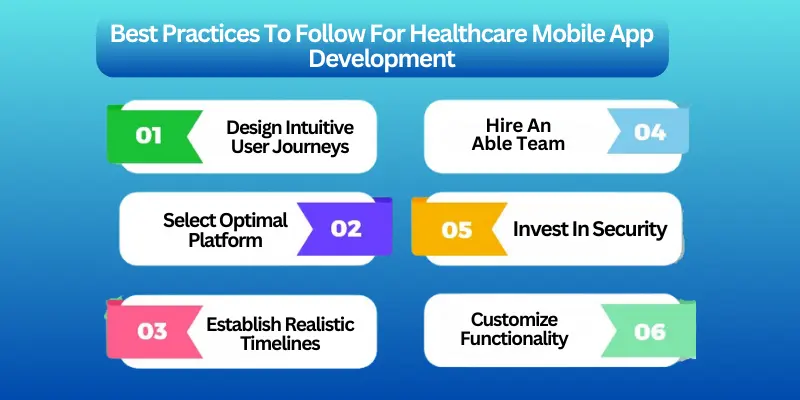
The process of creating and implementing robust healthcare applications requires the following set of guidelines.
Design Intuitive User Journeys
It is crucial to create user-friendly journeys that meet the objectives of the targeted individuals. Reputable healthcare mobile application firms employ design-focused user methods that involve journey mapping and prototyping. In-depth personas identify the objectives, issues, and skills of users in the targeted group, such as clinicians and patients. The user flows are carefully defined for each archetype in different scenarios. Wireframes with low to high fidelity get rapid feedback.
Tests on the usability of refined prototypes evaluate the performance. Responsive design allows content to be adapted to different platforms. The visual design, seamless navigation, and well-organized content structure are prominent. The experience is reviewed regularly before, before, and after launch to include ideas for improvement. After launch, mobile apps with advanced testing tools tweak the design. Analytics reveal untapped possibilities. UX is a top priority throughout a product's lifecycle to maximize participation.
Select Optimal Platform
Reputable Telemedicine App Development Company look at the technical requirements, user base profiles, strategic goals, Integration requirements, and long-term goals for scalability to select the most suitable technology platforms for their development. Most commonly, they evaluate cross-platform platforms, such as React Native and Flutter, that serve both storefronts.
Every option's strengths and weaknesses are assessed. Compatibility with healthcare infrastructure is thoroughly tested. Interoperability is ensured through adherence to HL7 FHIR standards, which enable the integration of health systems. A platform's ability to upgrade, the capacity to accommodate future advancements, and cost are also assessed. Qualitative and quantitative selection criteria allow optimal decision-making tailored to the individual's needs and goals.
The best option balances excellent customer experiences, smooth operation, sustainable long-term, and compliance with regulations in developing apps that facilitate the most cutting-edge healthcare delivery. Making an informed decision upfront can affect all aspects of the product's future.
Establish Realistic Timelines
The development of a mobile healthcare app successful project is dependent upon meticulous schedule planning, accounting for the entire effort anticipated. Expert developers consider technical hurdles, multiple target platforms, periodic maintenance, and regulatory approvals in realistic timeframes. A strict documentation system and weekly tracking of collaborative project boards such as JIRA and Azure DevOps allow for granular monitoring against the goals. In the event of unexpected obstacles, contingencies let you be flexible while setting expectations.
The necessary validation processes can be possible. Sequential phases of piloting govern the deployment stages. Stakeholder and user testing rounds should also be thoughtfully scheduled. Communication is essential to keep all stakeholders in sync with the advancement. Launching is contingent upon meeting all quality standards. After launch, support timeframes include feedback analysis as well as iterative updates. A prudent estimate supported by experienced app developers ultimately provides health solutions quickly, meeting customer demands.
Hire An Able Team
A team of cross-functional and empowered project managers is the basis for success. Professionally qualified medical mobile app developers participate in critical positions like UX designers, project managers, backend and front-end developers, testers, and clinical advisors. Their professionally trained and specialized backgrounds in healthcare and digital technology assure compliance with industry-leading standards. Defined duties and roles enhance the collaboration process and ensure accountability.
Knowledge-sharing sessions regularly facilitate knowledge and optimize resource utilization. Growth opportunities in the workplace encourage top-performance retention. Clear objectives and clear deliverables enhance the autonomy and responsibility of employees.
Invest In Security
Since healthcare apps handle susceptible patient information, solid security is vital to ensure the user's confidence and conformity with industry standards such as HIPAA. Security architectures are developed based on regulatory guidelines and the best practices of qualified health mobile app developers with a solid understanding of this subject. The architecture encompasses network, physical, and device-level security.
The transmission of data is secured by using approved algorithms. The authorization of access based on roles is strictly implemented. Document signing and biometric login increase authentication security. Regular monitoring and alerts help identify irregularities. Regularly, third-party audits verify control measures. Backups of files and disaster recovery plans take into account possible weaknesses. Sharing and deletion policies are in line with the rights of users.
Customize Functionality
Solutions off the shelf, although cost-effective, do not necessarily match up with complex and diverse processes in healthcare. Making generic solutions adapted to the needs of practice enhances users' experience and adds value. Healthcare mobile apps developed by specialized firms are adept at implementing customized layers of functionality through workshops on requirements analysis together with provider teams. Distinction branding, dashboards, and specially designed calculation modules are some of the customizations.
Estimates take into account the hours required for the complexity of the. Documentation, development, testing, and maintenance are all budgeted to prevent the possibility of scope expansion. Sprints prioritize vital aspects. Continuous support partnerships ensure that modifications are aligned with technological advances and standards updates, ensuring ongoing compliance and relevancy. Nuanced customized layers developed by skilled developers enhance the quality of care as per the organizational goals.
Conclusion
The process of developing an app for healthcare is essential for healthcare apps' development. This requires meticulous preparation, extensive market research, and an intense focus on detail. Making a health app requires understanding the healthcare app market's development process and intricacies.
To develop a health app that stands out from the highly competitive marketplace of apps, the focus must be on the specifics of mobile app development. Integrating artificial intelligence and machine learning in applications for medical use can offer users a better understanding of their overall health. Mobile phones are the perfect way to encourage an active lifestyle with apps for healthcare on the go.
The future of healthcare software is defined by the power of innovation, collaboration, and a desire to enhance patient care. With a constant commitment to quality and an emphasis on harnessing technology to improve patients' lives, Healthcare software can make significant contributions to healthcare's future.





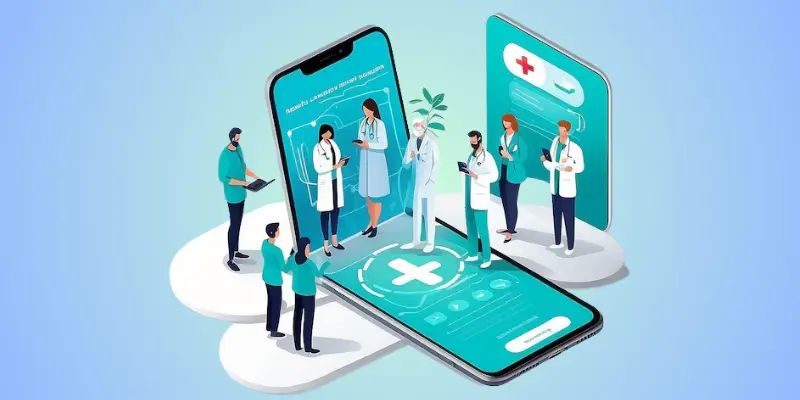


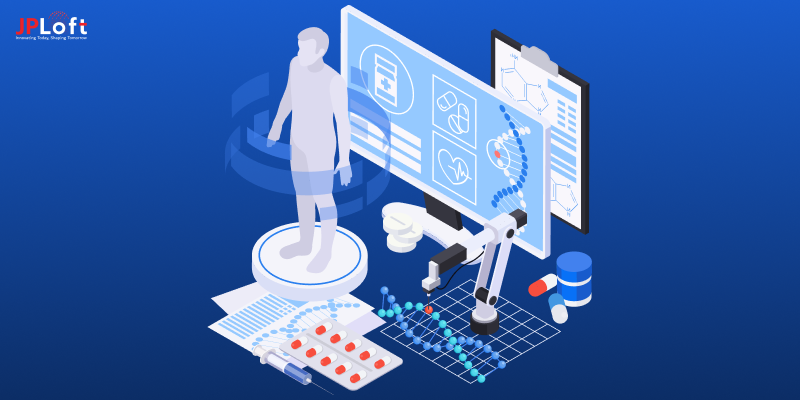
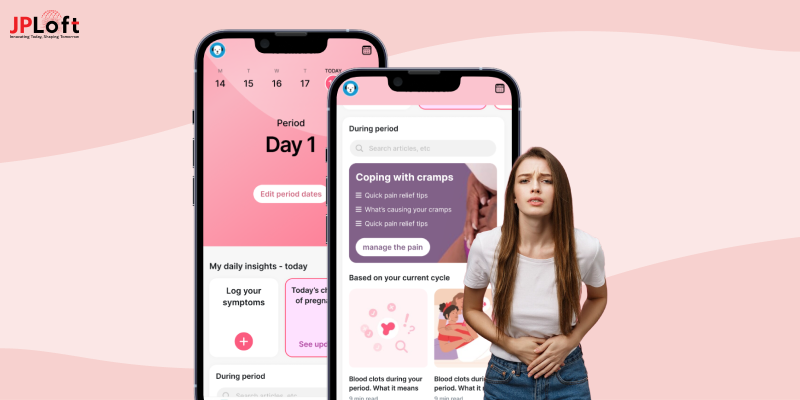
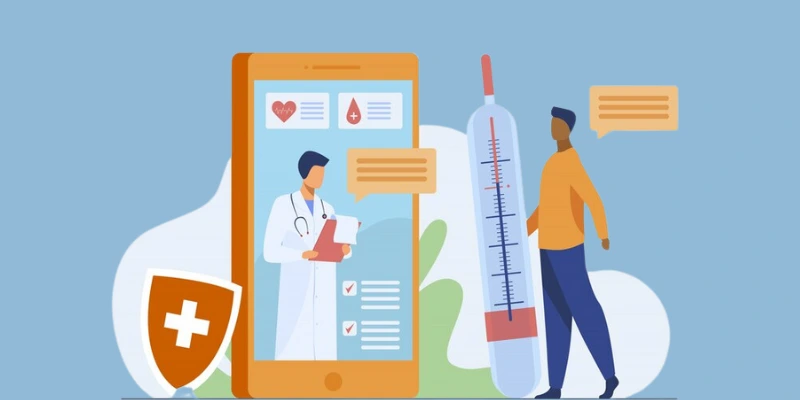



Share this blog